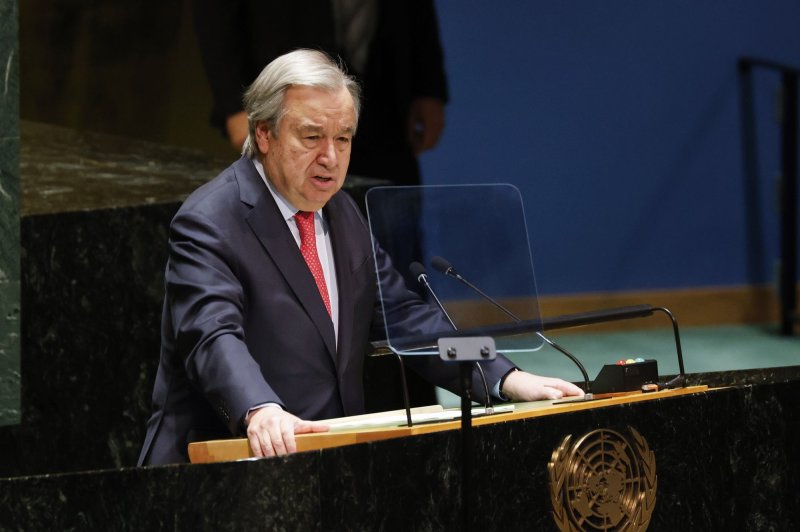Escape-artist Missouri bear heads to Texas zoo with moat

This 2021 photo provided by the St. Louis Zoo shows the zoo's Andean bear named Ben. The St. Louis Zoo announced Tuesday, March 21, 2023, that the escape-artist bear from Missouri is headed to a Texas zoo with a moat in hopes it will put an end to his wandering. (JoEllen Toler/St. Louis Zoo via AP, File)
ST. LOUIS (AP) — An escape-artist bear from Missouri is headed to a Texas zoo with a moat in hopes that it will put an end to his wandering.
The St. Louis Zoo cited the “specific and unique personality” of the Andean bear named Ben in announcing the move Tuesday. His soon-to-be home at the Gladys Porter Zoo near South Padre Island in Brownsville, Texas, has a long history of working with Andean bears. But it’s still adding some extra security measures.
“We’re confident it’s going to be good for Ben,” said Walter Dupree, the Texas zoo’s curator of mammals.
Ben gained notoriety in February by busting out of his habitat twice.
The first time, the 4-year-old, 280-pound (127-kilogram) bear tore apart clips that attached stainless steel mesh to the frame of a door. But he was recaptured before the zoo opened for the day.
Zoo workers then added zip tie-like attachments made of stainless steel that had 450 pounds (204 kilograms) of tensile strength. But Ben managed to escape through those about two weeks later. The zoo was open this time, but he was captured less than an hour later on a public path.
Ben now lives in a nonpublic area of the St. Louis Zoo, where he can move indoors and out — and even splash in a pool — while he awaits his move.
“He’s so fun, he’s so playful — we would love to be able to keep him here,” said Regina Mossotti, the St. Louis Zoo’s vice president of animal care.
U.N. Secretary-General Guterres calls for an end to the 'war on nature'

U.N. Secretary-General Antonio Guterres says it's time to stop "tinkering" in the global energy landscape and take the radical steps necessary to slow climate change.

U.N. Secretary-General Antonio Guterres says it's time to stop "tinkering" in the global energy landscape and take the radical steps necessary to slow climate change.
John Angelillo/UPI | License Photo
March 23 (UPI) -- Pointing to long-term trends that could make the planet uninhabitable for humans, U.N. Secretary-General Antonio Guterres said Thursday it was time to end the "war on nature."
Friday marks World Meteorological Day. Speaking ahead of the day, Guterres said the damage already done to the climate since the industrial age is "making our planet uninhabitable."
His comments come on the heels of a report from the U.N.'s Intergovernmental Panel on Climate Change, which said the continued use of fossil fuels, along with the "unequal and unsustainable" use of energy and land, has led to a general increase in average temperatures.
"This has resulted in more frequent and more intense extreme weather events that have caused increasingly dangerous impacts on nature and people in every region of the world," the IPCC said.
During the so-called energy transition, economies of scale are pursuing non-fossil fuel alternatives to avoid emissions, while at the same time advancing technology that can capture some of those pollutants. From the CEO of BP, to U.S. President Joe Biden, meanwhile, there's a growing sense that oil and natural gas will be part of the economy while cleaner technologies develop.
In the U.S. economy, the world's largest, natural gas accounts for 39% of the total mix for electricity generation this year and 37% for 2024. Renewables climb from 24% to 26% next year, though overall emissions of CO2, a potent greenhouse gas, increase by 0.6% from the 2023 forecast.
Guterres said it's time for "transformation, not tinkering" in the energy landscape. A radical transformation may be necessary to avoid further, and potentially irreversible, climate damage.
"It's time to end the relentless -- and senseless -- war on nature and deliver the sustainable future that our climate needs, and our children and grandchildren deserve," he said.
March 23 (UPI) -- Pointing to long-term trends that could make the planet uninhabitable for humans, U.N. Secretary-General Antonio Guterres said Thursday it was time to end the "war on nature."
Friday marks World Meteorological Day. Speaking ahead of the day, Guterres said the damage already done to the climate since the industrial age is "making our planet uninhabitable."
His comments come on the heels of a report from the U.N.'s Intergovernmental Panel on Climate Change, which said the continued use of fossil fuels, along with the "unequal and unsustainable" use of energy and land, has led to a general increase in average temperatures.
"This has resulted in more frequent and more intense extreme weather events that have caused increasingly dangerous impacts on nature and people in every region of the world," the IPCC said.
During the so-called energy transition, economies of scale are pursuing non-fossil fuel alternatives to avoid emissions, while at the same time advancing technology that can capture some of those pollutants. From the CEO of BP, to U.S. President Joe Biden, meanwhile, there's a growing sense that oil and natural gas will be part of the economy while cleaner technologies develop.
In the U.S. economy, the world's largest, natural gas accounts for 39% of the total mix for electricity generation this year and 37% for 2024. Renewables climb from 24% to 26% next year, though overall emissions of CO2, a potent greenhouse gas, increase by 0.6% from the 2023 forecast.
Guterres said it's time for "transformation, not tinkering" in the energy landscape. A radical transformation may be necessary to avoid further, and potentially irreversible, climate damage.
"It's time to end the relentless -- and senseless -- war on nature and deliver the sustainable future that our climate needs, and our children and grandchildren deserve," he said.
No comments:
Post a Comment